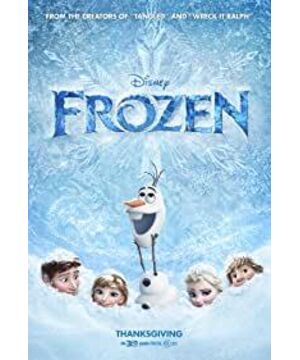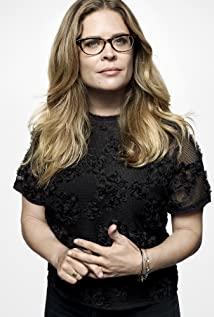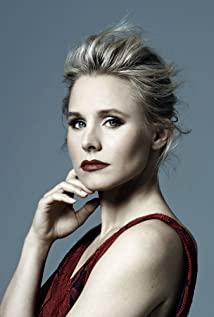There are actually a lot of metaphors and feminism in the story. The estrangement between the sisters also has a lot to do with how their parents deal with the problem. Childhood Elsa, after nearly killing her own sister with magic, "loved" her parents to put her in solitary confinement and told her to hide her special side, "conceal, don't feel, don't let them know "Isn't this alluding to the gay community? At the same time, it also insinuates that women are forced to adapt to certain norms in society. The consequence of Elsa's parents' approach is that Elsa is in constant fear and self-doubt, and this fear is the fuse of all subsequent events. Paper can't hold fire after all. I also like the setting of Elsa very much. She is not an evil villain. After accidentally revealing magic, she fled to the wilderness in order not to hurt people. Her various experiences also made her the most sympathetic character in the entire film. The film title "Frozen" also achieves a pun, referring to the freezing caused by Elsa's magic, and also represents the sisterhood of Elsa and Anna sisters who have been frozen since childhood.
It seems that when you mention "feminism", many people will express disgust. This is not to advocate that women are stronger than men, but to advocate equality between women and men. For example, after getting married and having children, women often "automatically" quit their jobs and stay home to take care of their children (this is still very common in the United States). Women should also have the right to pursue their own ideals, have the courage to be independent, and have the ability to control their own destiny. This is what feminism advocates. The development of feminism can also be seen in miniature from Disney's history of princesses. The first princesses, such as Snow White and Sleeping Beauty, seemed to be advocating "go for a walk in the forest so you can meet a handsome, rich and handsome prince and live happily together". Their fate is not their own, but depends on men to save them, and marriage is their belonging. The Little Mermaid may have been the first modern Disney woman to go off the beaten track. Her father's demanding requirements are also the epitome of the repression of social norms, but she is uncompromising and insists on breaking the rules, but there are still limitations. For example, in a climactic duel with the villain, these princesses rarely defeat the villain themselves (except for Mulan, but they are not princesses anyway). In Hollywood's traditional three-part script structure, the final climax always involves the final battle between the protagonist and the villain. Disney's climax design is always a little over the top, and it's weird to have a climax in order to get a happy ending. For example, the witch in "The Little Mermaid" was killed by the prince's ship, the villain in "Beauty and the Beast" fell to her own death, and the female villain in "Tangled" also fell to her own death, all of which have nothing to do with the heroine. The climax of a movie is theoretically meant to embody the final sacrifice and struggle of the protagonist for his own goals, but none of these princess movies embody that, and are instead created to create a climax where the villain is defeated, not to embody The struggle and sacrifice of the protagonist. These princesses may have their own ideas and desires for freedom, but they always need external stimuli to act. The little mermaid has always longed for a human life, but only when she fell in love with the prince and quarreled with her father did she have the determination to become a human; Rapunzel always wanted to see the Kongming Lantern, but only a thief who was familiar with the outside world sent her to the door to let her go. Courage at home. They have their own goals, but they are not always working towards their goals and they are not paying too much. This is where these princesses fall short. They have the seeds of feminism, but they still need outside guidance. And "Frozen" heroine Anna can say that the goal is very clear and has been working hard. Her goal is not so much to find true love as to repair the relationship with her sister. Anna has always been proactive and has been working hard for her goals. sister When the elder sister had an accident, Anna plucked up the courage to go alone; when the elder sister chased her away, she insisted on staying as company; when the elder sister was killed, she desperately tried to save her. From the perspective of script creation, Anna is a highly unified character, her goal is very clear, and she has always paid the price for her goal, so the audience has a lot of emotional projection with her. The most taboo in movies is to have a passive protagonist, because if the protagonist himself doesn't care about the goal, why should we care? The film also has the most brilliant climax of Disney animation in recent years. Not only is the protagonist defeating the villain himself, but also the sacrifice that the heroine is willing to make in order to achieve her goal is highly reflected. Cinema is a visual art, which means that it is not the emotions of the protagonists that define them, but their actions. We don't know how much Anna would have paid for her ideals if it weren't for the actions that culminate in the film's climax. She sacrificed her love and her life to achieve her goals. No one forced her, no one guided her, and the final choice was made by herself. How powerful this is, this is called complete feminism. For the first time in forever, Disney princesses don't need a prince to save them. Although it is inevitable that they must be a couple in the end, but Anna ended up marrying a man who has been with her the longest, rather than marrying a rich and handsome man who fell in love at first sight. Love view: choose the man who stands with you through thick and thin In forever, Disney princesses don't need a prince to save them. Although it is inevitable that they must be a couple in the end, but Anna ended up marrying a man who has been with her the longest, rather than marrying a rich and handsome man who fell in love at first sight. Love view: choose the man who stands with you through thick and thin In forever, Disney princesses don't need a prince to save them. Although it is inevitable that they must be a couple in the end, but Anna ended up marrying a man who has been with her the longest, rather than marrying a rich and handsome man who fell in love at first sight. Love view: choose the man who stands with you through thick and thin
The best part is that Anna saved herself! ! I don't think my sister woke up crying in tears, okay? (Of course everyone understands it differently). Why is this film great, because the heroine saved herself, the act of true love (choose to save her sister and sacrifice herself) was done by Anna herself, not by outsiders, not by passively relying on the kiss of true love from others, but by herself! Save yourself! So don't be rude! The princess doesn't need a prince to save! The princess doesn't need a man to save! The princess doesn't need anyone else to save her anyway! So I always feel that it has nothing to do with my sister's tears. Although my sister's tears must belong to act of true love, but there is always a cause and effect, right? why cry? Her Royal Highness the Queen cried because she found out that Anna had decided to sacrifice herself, so Anna's own act of true love saved her first, and the Queen cried later. Although Her Royal Highness is pitiful in the whole play, we all sympathize with her, but she is indeed the most passive protagonist. She is always inspired by the outside world, always forced to act by the outside world, rather than always taking the initiative like Anna. If it hadn't been for the magic of the party, she would have kept it up. Let it go is also because "Oh, I was accidentally discovered by you, forget it anyway, there is no need to hide anymore", not because "I don't want to hide, so all you suckers should give my mother to eat shit" and take the initiative to show magic to let it go. See the difference? I don't think it's a bad thing. Sometimes I worry too much because I care too much and love too deeply, so I don't want to hurt her. What's more, she has national responsibilities, so we sympathize with the Queen, but it doesn't change her, she is still relatively passive. this fact. Off topic. Someone will definitely argue with me about who saved Anna, but that's what I think anyway. A thousand people have a thousand Hamlets in their hearts.
View more about Frozen reviews











